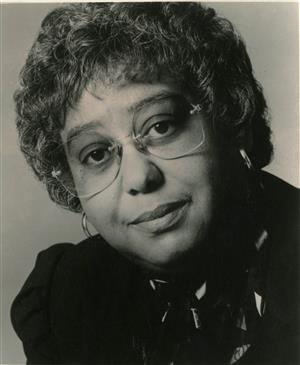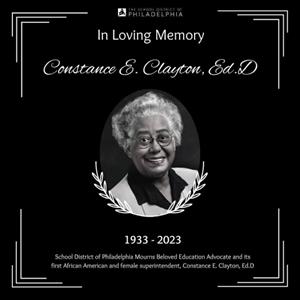- Council of the Great City Schools
- Influential Philadelphia Educator and Council Leader Remembered
Digital Urban Educator - October 2023
Page Navigation
- 'Urban Educator of the Year’ Honors Go to...!
- Council Aims to Amplify Student Voices at Town Hall Meeting
- Toledo Superintendent Reflects on Decade at the Helm of Hometown District
- Influential Philadelphia Educator and Council Leader Remembered
- Q&A Document on Role of Race in College Admissions Applications
- Council Releases New Reports
- 2023 Blue Ribbon Schools Named
Influential Philadelphia Educator and Council Leader Remembered
-
Constance Clayton, the first Black and first female superintendent of The School District of Philadelphia, who died in September, played a major role in shaping the modern-day, influential standing of the Council of the Great City Schools.
Clayton, who was known as Connie, led the Philadelphia school system – then the fifth largest in the country – from 1982 to 1993.

“Few people in the history of urban public education had the positive impact on the field that Constance Clayton had,” said Michael Casserly, the Council’s longtime executive director, now a strategic advisor. “Connie took the reins of the Council at a critical moment in the early 1990s to set the national organization on a path that ultimately made it the powerhouse it became. None of the group’s successes over the years on behalf of urban children would have been possible without her.”
In an interview with the Urban Educator, Casserly recalled how, in the 1980s, when he headed the Council’s legislative and research units, he would call upon Clayton to testify on behalf of the organization.
“She made an excellent witness,” Casserly recalled. “She commanded respect not only from other people who were testifying but from the members of Congress itself.”
In one memorable appearance, Clayton began to read her testimony before the Senate Health, Education, Labor, and Pensions Committee, chaired by Sen. Edward Kennedy, when Kennedy interrupted and suggested she summarize her remarks.
Clayton asked Kennedy whether he had read her submitted testimony. After Kennedy replied no, Clayton picked up where she had left off.
“She was just that kind of person – she brooked no nonsense. She was serious, smart, determined, committed, and I just had enormous respect for her,” Casserly said.
A True Educator
The Council was at a crossroads in the early 1990s – the longtime executive director and deputy executive director had both left, the Council had just 47 members, and finances were shaky, but the main problem, said Casserly, was that “membership had really lost confidence in the organization.”
Clayton served as chair of the Council from 1991-1992 and one of her first acts as chair was to fire all five staffers. She then rehired Casserly and tapped him to rebuild and redefine the Council. “She said hire who you want but I’m going to watch your every move,” he said.
“Connie basically said, ‘If we’re going to have an organization, then we’re going to be serious about it.’ ... And if it wasn’t for her commitment and determination and strength to make that happen, then the Council would have folded.”

Clayton was born and raised in Philadelphia. She graduated from Temple University and began her career as a fourth-grade teacher in the Philadelphi school system. Midcareer, she designed the district’s social studies curriculum and headed the district’s African American studies program. Philadelphia later became the first district in the country to make African American studies a requirement for graduation, according to the district.
Philadelphia Schools Superintendent Tony Watlington Sr. praised Clayton, saying he regarded her as a friend and adviser. “She embodied a true educator and humanitarian through her dedication to improving the lives of children in education,” Watlington said in published remarks.
At Clayton’s funeral, Watlington described how the educator remained keenly interested in education to the end, calling him just days before her death to discuss after-school programs, math curriculum, and year-round school. The educator was a month shy of her 90th birthday at her death.

In 1994, the University of Pennsylvania Graduate School of Education established the Constance E. Clayton Chair in Urban Education.
Council Executive Director Ray Hart said Clayton will be remembered for playing a critical role in redefining the purpose and direction of the Council in the early 1990s when she served as chair.
“Under her leadership, the Council’s Board of Directors tapped Michael Casserly to serve as the Council’s executive director, resulting in the unparalleled growth of the organization and our ascendance as one of the premier educational advocacy organizations in the country,” said Hart. “With her death, the Council has lost one of the most important figures in the organization’s history.”
Media Contact:
Contact Name
Contact@email.com
(000) 000-0000
Contact Name
Contact@email.com
(000) 000-0000
Contact Name
Contact@email.com
(000) 000-0000
Media Contact:
Contact Name
Contact@email.com
(000) 000-0000
Contact Name
Contact@email.com
(000) 000-0000
Contact Name
Contact@email.com
(000) 000-0000


